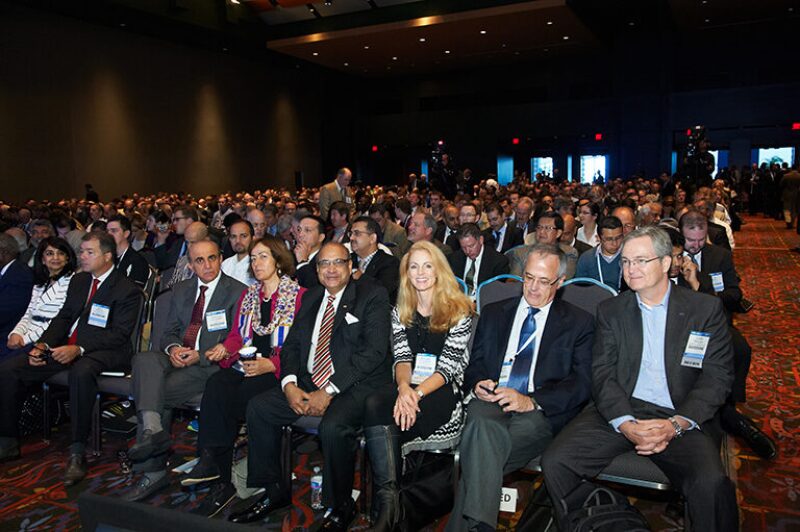
Of all the programs that SPE offers, the most rewarding and enjoyable ones for me personally are the conferences. I love walking the floor of an exhibition hall, discovering the latest technology advancements, and listening to the various product demonstrations. I look forward to running into fellow SPE members in the vast conference halls and catching up on what they’ve been doing since we last met. When exiting the room of a technical session, I like being able to turn to the person next to me and ask their opinion about the presentations we just heard. Finally, I relish being able to attend the receptions and luncheons to network with industry colleagues. I attribute most of my career achievements to those moments of connecting with others and learning from them during SPE conferences.
For good ideas and true innovation, you need human interaction, conflict, argument, debate.
As much as I yearn for our conferences to return, I suspect they will be different as we incorporate more social distancing and other protective measures; however, how this will affect the experience is unclear. There have been many opinions shared by our members on whether SPE should fully convert to virtual conferencing. We have been asking ourselves: Can attendees and exhibitors realize the same amount of value at a virtual event when compared to a physical one?
Let’s examine this from several perspectives, starting with the exhibitors’. Over the years, some of our exhibitors have expressed that they were not satisfied with the value of having a traditional exhibit booth. The cost for exhibitors to have a booth can be quite high when considering the shipping of booth materials and manpower required. Exhibit booths are a tried-and-true method to connect to potential customers; however, recent advances in digital marketing are proving to be very effective as well. Perhaps virtual exhibition halls will bring value to exhibitors and provide a broader platform from which they can educate potential customers about their products and services.
For many authors, the coveted opportunity to present a paper at an SPE conference is a career goal, especially at ATCE. I will never forget being at the 2003 ATCE in Denver, Colorado, to present my first ATCE paper. I vividly recall feeling proud yet nervous while standing at the podium and seeing my mentor, James Pappas, at the back of the room to show his support.

At the conclusion of my presentation, I remember the rush of adrenaline and sense of accomplishment upon hearing the applause from the audience. If I had been using a virtual platform, I do not believe I would have felt these same emotions. Giving a virtual presentation can be less engaging due to being unable to “read’ and hear the audience. Still, it does offer the advantage for authors to present their work when they cannot be there physically. The recent pandemic has prevented our authors from presenting in person, but historically, there have been other challenges for authors such as being unable to attend the conference because of delayed or denied entry visas or lack of funding for travel. A significant advantage of virtual events is the removal of such barriers.
Two monologues do not make a dialogue.
Acting as a panel speaker or panel session attendee, I have found the experience to be quite engaging and entertaining.
When in the audience, I enjoy listening to lively banter between the panelists, and when a panelist, I love to stir up debate. Over the past few months, there have been many virtual panel sessions hosted by a variety of organizations, including SPE, and I have participated in many from my remote office (aka my dining room table). I’ve found that the more successful sessions featured panelists, who were comfortable engaging in remote conversation, presenting in a virtual environment, and when the moderator was more attentive to the panelists than the scrolling list of comments from participants. SPE has been learning how to deliver quality virtual panels so that we cannot only succeed but excel at producing these popular events and incorporate them into virtual conferences.
As a conference attendee, I not only look forward to the sessions, exhibits, and networking but also to the time away from the typical office disruptions. I block off conference days in my calendar so that I can devote my full attention to the technical presentations. Then I use the evenings back at my hotel to rest after a full day of walking, reflect on what I learned, and plan my next day of sessions and demonstrations.
Attending a virtual conference does offer more conveniences such as not having to travel and wear business attire. But would an individual sit in front of a computer screen and listen to a full day of live-streamed sessions? The option for recording presentations and making them available for viewing afterward would be beneficial for participants in other time zones or ones who cannot dedicate long blocks of time to participate in the live sessions. Unfortunately, they would not be able to participate in the Q&A portion, which can be one of the most rewarding elements of the session.
That was a good time when friends were made and not just added.
Finally, there is the networking aspect. Networking is where I find the greatest value in attending conferences and is the most challenging aspect to replicate in a virtual environment. Dana Sitar, who is a contributor to www.moneycrashers.com, authored an article titled “How to Make the Most of Attending Online Virtual Conferences.” She wrote, “One of the most significant drawbacks of virtual conferences is the lack of natural social situations. You aren’t in rooms with other attendees, shaking hands with speakers, sharing drinks with colleagues, or catching up over a meal.” The article provides many tips to enhance your virtual conference experience. Sitar concludes, “Take a virtual conference as seriously as you take in-person events—especially when it’s your only option. If you’re focused, engaged, and motivated, you can get just as much out of attending a conference from your living room as flying across the country for it.”
Our Society will be offering several virtual events this year. This is a new approach for us, and we are on a steep learning curve. I encourage SPE members to attend as many as you can and provide honest feedback on the experience. While we are primarily hosting virtual events out of necessity due to the pandemic, I believe that this marks an inflection point for SPE. Future events may be a hybrid of both physical and virtual conferencing to meet the needs of our members. The virtual format may open up new opportunities such as paying for a single topical track or other “packaged” content of interest.
In the middle of every difficulty lies opportunity.
When we are confronted by any crisis, the period of recovery often offers opportunities to emerge better and stronger than before. If we are imaginative, innovative, and perhaps a bit patient, we can deliver a superior and more valuable experience in attending our conferences with the bonus of making them accessible to more of our members. I believe that we can and will emerge from this challenging time as a stronger SPE, able to deliver more to our members.
What additional advantages do you think virtual conferences will provide for you? Please send your response to president@spe.org. To hear Shauna’s President’s Column via podcast, please go to www.spe.org/en/podcasts.

